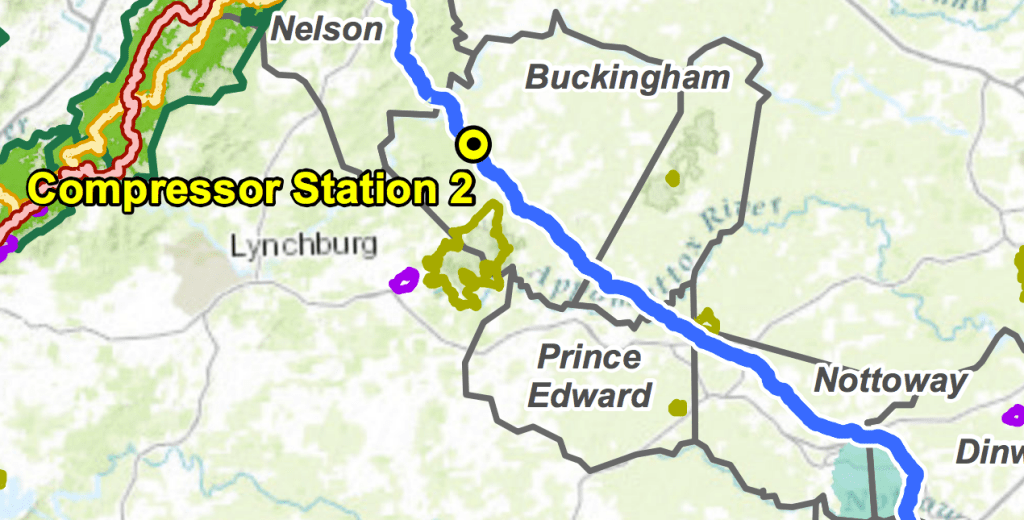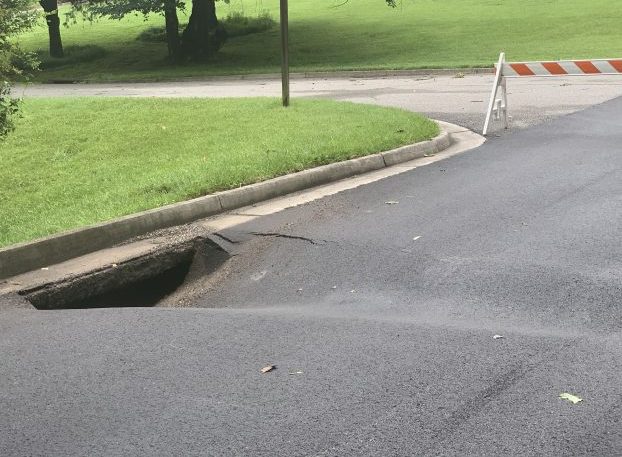Demand drives access to gas
Published 12:42 pm Thursday, January 5, 2017

- DOMINION The 600-mile Atlantic Coast Pipeline would span the Heart of Virginia, traveling across Buckingham County, bisecting southern Cumberland County, and slicing the eastern tip of Prince Edward County.
Editor’s Note: Today, we take a deep dive into how Atlantic Coast Pipeline affects, if at all, likelihood of natural gas service for localities in the Heart of Virginia, including homes and businesses.
The answer is clear to how homes and businesses across the Heart of Virginia could have access to natural gas from the proposed Atlantic Coast Pipeline (ACP) project.
Trending
Demand from potential customers and the volume of those who would foot the bill to use the product — whether it’s for manufacturing widgets or heating an eye on a stove for breakfast — drives access.
Columbia Gas of Virginia is the sanctioned local distribution company that businesses and others would justify the need to. Dominion, the firm leading ACP, LLC, is providing the transmission service of the gas.

Robert C. Innes
“Columbia Gas of Virginia welcomes the opportunity to provide natural gas service to new customers in our service territory,” said Robert C. Innes, a spokesman for Columbia Gas. He said the firm “conducts an evaluation to assess the economic value of providing service. The assessment is based on a number of factors, including the volume of natural gas required by a customer or customers, the pressure at which delivery is required, the facilities needed to be constructed and the distance to the pipeline supply source.”

Wade Bartlett
According to Dominion spokesman Aaron Ruby, Columbia Gas would be the firm to build out a “distribution network of pipes to connect into the ACP,” which, in turn, could provide access to homes and businesses.
“Those are local distribution companies (contracting) to take gas off of the ACP so that they can distribute that to their retail customers in their service territories. So, ACP does not deliver natural gas to retail customers like homes and commercial businesses,” he said.
“They need to pull together enough demand load that it justifies the cost of investing in that infrastructure,” Ruby said.
Trending
The proposed pipeline is currently routed to enter Buckingham County under the James River east of Route 56, span the county, entering southern Cumberland County and bisecting Route 45, and crossing the eastern tip of Prince Edward into Nottoway.
When the project was first proposed, Prince Edward County looked into the possibility of a tap, according to County Administrator Wade Bartlett.
“I do remember that we would need to show a daily usage of 10,000 dekatherms. One dekatherm is equal to one million (British Thermal Units). This is an extremely large amount, and, in looking at the existing possible users in Prince Edward, we couldn’t come close. That meant if we wanted a tap, someone would have to pay for it,” Bartlett said.
The county was told “a tap and a metering and regulating station would cost $4-6 million. Obviously this was beyond the capacity of Prince Edward County.”
Calling the figures “very rough estimates,” Ruby said the actual tap could cost “anywhere from $500,000 to $1 million. A basic metering and regulation station could cost somewhere in the neighborhood of $5 million, or potentially more.”

Vivian Seay Giles
He said tap costs are determined on a case-by-case basis, with many factors, including capacity.
The threshold for a potential customer to gain a transportation service agreement with ACP and secure a tap and metering and regulation station is 10,000 dekatherms a day, Ruby said.
“The 10,000 dekatherm-per-day threshold that a potential customer would need to meet to gain access to a tap represents about 0.7 percent of the total capacity of the pipeline,” he said. “In other words, there is still enough available capacity to meet the needs of potential industrial customers or local gas distribution companies along the route. As we discussed, we’re actively marketing that remaining capacity to potential customers, and for the very same end uses you’re talking about — residential home heating and fuel for local businesses.”
The total capacity of the ACP is 1.5 cubic feet per day, said Ruby, equating to 1.5 million dekatherms per day.
Ninety-two percent of the ACP’s capacity has been secured through customer agreements, Ruby said.
Regarding the remaining 8 percent, Ruby said ACP is “still actively marketing that remaining uncommitted capacity. And that could be for potential public utility customers or potential large industrial customers.”
A majority of the gas — 80 percent — will be used for energy generation, he said, fueling power plants to serve 500,000 people.
Though a tap is “beyond the capacity of Prince Edward County,” Bartlett said the potential tap and lateral line being explored by Buckingham County, ACP, LLC, Kyanite Mining Corp. and Columbia Gas, could benefit Prince Edward.
“The main benefit of a tap in Buckingham would be the potential for … the location of a firm needing natural gas and … the future expansion of the distribution lines from the tap into Prince Edward County,” he said.
“Even if the access to the tap was initially limited to only Buckingham County, it would be a benefit to our entire region. If a company located in Buckingham County, our citizens could obtain employment at the plant. Because of Farmville’s history as the regional center, some of the increased wages see there way to Farmville and Prince Edward. You could also have spin-off companies that could locate in Prince Edward.”

Gerald Spates
“The proposed tap in Buckingham County is the first step in the distribution of natural gas to the county,” Innes said. “The driving force behind that economic evaluation is the industrial customer. The potential tap in Buckingham would not directly benefit the other areas, however, the proposed ACP locating in Cumberland and Prince Edward counties provides an opportunity to evaluate natural gas service in those areas.”
Though residential access “is not in the initial plan, as I have seen,” Cumberland County Administrator and County Attorney Vivian Seay Giles noted, “that’s not to say that, in the future, residential access would not be available.”
“For commercial purposes, it would require a user that would have a usage capacity … substantial enough to justify the access,” which the county doesn’t currently have, Giles said regarding the potential of a tap.
“I know sometime ago we looked at extending the gas line to Farmville from that Appomattox line. And it was really expensive,” said Farmville Town Manager Gerald Spates.
While he said he didn’t know the costs of tapping into ACP, he thought “it would be something that we should look into.”
“I don’t know how many residents would use it, but I know possibly the university and some of the industries that are here would probably take advantage of it.”
“If you take a look at the airport, (it) doesn’t just serve Farmville, it serves Buckingham, Prince Edward and Cumberland counties,” Spates said, comparing it to the ACP. “When somebody looks at your community, they look at everything that’s available.”
Because the Federal Energy Regulatory Commission, or FERC, the body that has approval process of the ACP, is regulating the project as an open access natural gas pipeline, when capacity becomes available, “any large industrial customer … or public utility will have access to be able to tap into the pipeline and contract for transportation service on the pipeline,” said Ruby.
According to Innes, natural gas provides an additional energy source “to the communities where it is available. It can be used for residential, commercial and industrial uses which could add to the local economy. Natural gas is a domestic source of energy which is the most environmentally attractive hydrocarbon. The abundant supply is keeping the commodity price in a favorable position for the foreseeable future. Natural gas provides basic and necessary infrastructure for economic development opportunities.”
Access to the proposed ACP from any industrial park in Lunenburg County would be cost prohibitive, according to its community development director.
“If taps will be made available along the route, the cost, in excess of $1 million per mile, of getting a line to any industrial park in Lunenburg County would be prohibitive,” said Beverly Hawthorne.
The proposed natural gas pipeline isn’t slated to travel through Lunenburg County, though it will pass through neighboring Nottoway and Prince Edward counties, which, if taps are located there, could have residual effects on Lunenburg.
“Generally, because of the scheduled route of the ACP, which passes through Prince Edward and Nottoway, Lunenburg County will not have access to the gas,” Hawthorne said. “The route, at its closest point, is over 20 miles from the industrial parks in the county.”
“(County Administrator) R.B. (Clark) and I discussed this, and because Charlotte County is a significant distance from the pipeline route, he did not feel this was something that would directly impact Charlotte. …,” said Charlotte County Planner Monica Elder.
“What we’ve been able to accomplish in Buckingham illustrates all the different pieces that have to be in place in order to make something like this work,” Ruby said of the proposed tap that Kyanite is working toward.
The first piece of the puzzle was the mining firm, an existing industrial company that was “interested in taking on a certain amount of capacity to power their operations,” Ruby said. “Then you had other potential customers … in the area who could potentially take an even larger amount of capacity off the pipeline. And then, most importantly … the local distribution company, who has the license for that service territory, in this case Columbia, agreed, in principle, to tap into the pipeline and build out the distribution network, the lateral line, in order to serve Kyanite and other potential industrial users on that site.”





